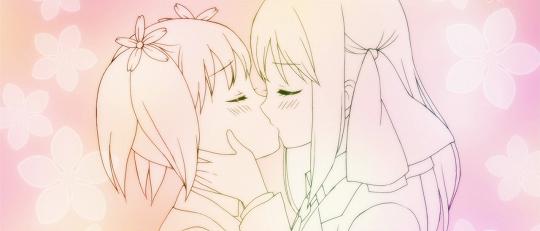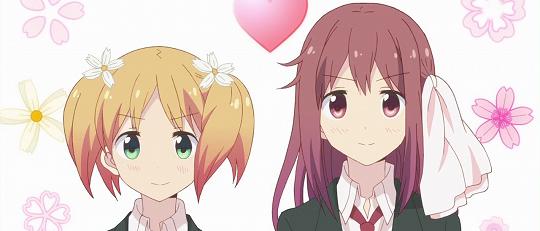It’s right there in the first few lines of the opening: “Kiss kiss kiss, I can’t take my eyes off you”. That’s the entirety of Sakura Trick, the length and breadth of its offering. The initial gambit is much bolder: a fluffy but uninhibited romance between two young women; the reality though lacks a lot of what could have made that worthwhile. Wait, rewind. Sakura Trick isn’t for me. As a modern, self-effacing male, it’s probably prudent to start with that. It’s also not as though I have a whole lot of context for what the twelve episode series brings to the shoujo ai genre (although Wikipedia insists it’s targeted at young adult males). Certainly I have touchstone shows to fall back on like Sailor Moon and Revolutionary Girl Utena as well as the briefest of exposures to Maria-sama ga Miteru and Strawberry Panic but in terms of it embodying or enhancing its genre? Very little.
It’s refreshing at first to see an intimate relationship between two characters in an anime that doesn’t cleave closely to the harem or chase-the-girl setups. The series is bookended by what feels like a natural progression for the two protagonists: starting with them advancing to more than just friends and finishing with them questioning what love is. The naturalness presents the initial allure because it normalises a same-sex relationship that is elsewhere presented as coy and unspoken with series like My-HiME or even Stellvia of the Universe. It becomes a given that Haruka and Yuu are together and that either their friends are oblivious to it or blithely accept it.
For a while that situation works well and the trivial nonsense that goes along with being in a relationship with someone - especially as a young teenager - fills most of the early episodes. Unfortunately, the overbearing sister then bulldozes that setup and brings some not unexpected “but you’re both girls!” thinking. It’s disappointing because it feels like such a tired regression, meant to inject some drama into a so far undramatic relationship. Instead it comes across as needlessly small minded and in the wake of the series’ conclusion ridiculously hypocritical; that’s perhaps the point but it doesn’t make it any more palatable or less regressive. Worse still is the fleeting glance of another couple whose circumstances overshadow anything the main pair could muster and is criminally undeveloped shy of half an episode that does double duty as the swimsuit segment.
What’s left then is a rather tepid wander through an atypical high-school setup. And that’s not just with the fictional school closing down - a rich vein of possibilities left almost entirely untapped - looking at Sakura Trick in the context of Japanese sexuality is revealing insofar as what the series is indicative of. Certainly there are no scientifically accurate studies on the distribution of sexualities in any given country, the methods for data collection just don’t work (and be skeptical of any study that purports to), so my assumption that the - for want of a better term - density of lesbians in the series was stretching belief can’t be validated.
Certainly when you look at reported public opinion, the acceptance of homosexuality is skewed towards the young and female, helped along by openly gay and transgender politicians and celebrities as well as high profile gay weddings. So Haruka and Yuu’s friend’s acceptance of their relationship isn’t, at least statistically, so odd. Whether the reality of high school life in Japan is any different is up for speculation and debate. Even trying to put the series into some kind of historical context is fruitless with volumes of text on the regimented homosexuality of the samurai and their apprentices, but little to nothing on feminine sexuality - and this is without getting into the matriarchy / Amaterasu area of history and lore. It’s difficult to question what the series presents then, and the accepted western view of homosexuality in high school is very different to that in Japan. The series of course never claims to be representative of reality, but my initial rejection of the premise is, upon research, unfounded.
So realistically I have nothing to offer with regards talking around Sakura Trick and talking about it boils down the realisation that I didn’t particularly empathise or even like any of the central characters. Haruka and Yuu come off as whiny and grating which isn’t unexpected given their age; the sister tries to play the smitten fool but instead comes off as the myopic and domineering sibling while everyone else is barely given enough material to be anything more than forgettable. All of this wreathed in pastel shades and inundated with an endless source of cherry blossom petals forever getting caught on squalls of wind, the high-keyframe opening belies a general sloppiness and stylistically uninspired presentation.
It is with as much deference as I can muster to say that this is not for me and that my expectations for drama, (melo- or otherwise), strong characterisation or just a competent slice-of-life approach weren’t met. Instead I got a lot of cliche, a proliferation of dud humour interspersed with very infrequent laugh-out-loud moments and a huge amount of wasted opportunities.





